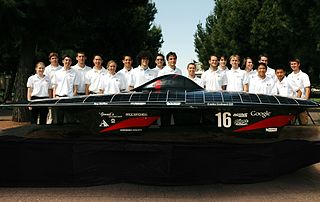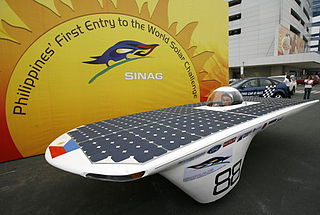Related Research Articles

The World Solar Challenge (WSC), since 2013 named Bridgestone World Solar Challenge, is an international event for solar powered cars driving 3000 kilometres through the Australian outback.

The American Solar Challenge (ASC), previously known as the North American Solar Challenge and Sunrayce, is a solar car race across the United States. In the race, teams from colleges and universities throughout North America design, build, test, and race solar-powered vehicles in a long distance road rally-style event. ASC is a test of teamwork, engineering skill, and endurance that stretches across thousands of miles of public roads.

The University of Calgary Solar Car Team is a multi-disciplinary student-run solar car racing ("raycing") team at the University of Calgary, based in Calgary, Alberta, Canada. It was established to design and build a solar car to compete internationally in the American Solar Challenge (ASC) and the World Solar Challenge (WSC). The team is primarily composed of undergraduate students studying Engineering, Business, Science, Arts and Kinesiology. The mission of the University of Calgary Solar Car Team is to educate the community about sustainable energy and to serve as an interdisciplinary project through which students and faculty from various departments can collaborate in supporting sustainable energy.

The Stanford Solar Car Project (SSCP) is a student group at Stanford University that designs, builds, tests, and races solar-powered vehicles. The SSCP, a student-run, donation-funded organization, has been building and racing solar-powered vehicles since 1986. It has competed and placed at The World Solar Challenge, the Global Green Challenge, and American Solar Challenge.
The UNSW Solar Racing Team is the solar car racing team of the University of New South Wales in Sydney, Australia. The team currently holds a number of world records and is best known for its participation in the World Solar Challenge (WSC). Since its founding in 1996 by Byron Kennedy, the Sunswift team has built a total of 6 different cars, the most recent of which is Sunswift VI.

The University of Minnesota Solar Vehicle Project, or UMNSVP, is a team of undergraduate students from the University of Minnesota that designs and constructs solar-powered cars. In its 31 years, it has established itself as one of the world's top solar racing teams, and the top Cruiser/Multi-Occupant Vehicle team in the Western Hemisphere, with top-two finishes in eighteen of thirty-four events entered.
PrISUm Solar Car is the multidisciplinary student-run solar car racing team from Iowa State University that designs and builds solar powered vehicles to compete in the American Solar Challenge (ASC). The club was founded in 1989 by a group of engineering honor students from Tau Beta Pi and was simply known as the ISU Solar Car Project. In 1990, the team adopted the name of its first car, PrISUm.

A solar car is a solar vehicle for use on public roads or race tracks. Solar vehicles are electric vehicles that use self contained solar cells to power themselves from sunlight. Solar vehicles typically contain a rechargeable battery to help regulate and store the energy from the solar cells and capture kinetic energy from the vehicle during braking. Some solar cars can be plugged into external power sources to supplement the power of sunlight used to charge their battery.
John Francis Harvey was an Australian racing driver. He was a top Speedcar driver for many years in the 1950s and 1960s, winning many championship races including the NSW Championship for three successive years and the Victorian Championship twice before turning his skills to road racing where he had a long and successful career until his retirement at the end of 1988. In 1987 John made history driving the General Motors Sunraycer to victory in the inaugural World Solar Challenge from Darwin to Adelaide, the first international race for purely solar powered cars.
Solar car racing refers to competitive races of electric vehicles which are powered by solar energy obtained from solar panels on the surface of the car. The first solar car race was the Tour de Sol in 1985 which led to several similar races in Europe, US and Australia. Such challenges are often entered by universities to develop their students' engineering and technological skills, but many business corporations have entered competitions in the past. A small number of high school teams participate in solar car races designed exclusively for high school students.

The SINAG, based in De La Salle University in the Philippines, is the first Philippine solar-powered race car and the first entry of the Philippines to the World Solar Challenge.
The Cal State LA Solar Car Team is an engineering team from California State University, Los Angeles. The team develops the Solar Eagle, a series of solar cars that have taken part in solar car races in the United States and in Australia.

The Midnight Sun Solar Rayce Car Team is a Canadian solar car race team affiliated with the University of Waterloo of Waterloo, Ontario. Founded in 1988, the Midnight Sun team is a student-run organization which designs and builds a solar vehicle every two to three years to compete in two solar challenges; the World Solar Challenge, held in Australia, and the American Solar Challenge, held in the United States.

The UltraCommuter was a hybrid electric concept car first designed by the University of Queensland Sustainable Energy Group and unveiled in 2005. In 2007 the project was transferred to the Waikato University School of Engineering and further developed in conjunction with HybridAuto Pty.
Nuna 1 was a car powered by solar power, developed by students from the Delft University of Technology.
The Aurora Vehicle Association is a group of volunteers who are dedicated to achieving and demonstrating extreme efficiency in transport. Aurora was started in 1980 by building high-fuel-efficiency petrol-powered vehicles. Between 1983 and 1985 Aurora held the world record for fuel economy at 1808 km per litre. In 1987, when Hans Tholstrup devised the first trans-Australian World Solar Challenge, Aurora turned to solar car development and has been a contestant in every World Solar Challenge and has achieved 1 win, 4 second places, 1 third place, 1 fifth place, 1 sixth place and 1 crash.

Blue Sky Solar Racing is a student-run team at the University of Toronto that designs and constructs solar powered vehicles to race in international competitions.

ANU Solar Racing is the Australian National University's student-led solar car racing team. The team is built to innovate, bringing together a highly range of backgrounds ranging from engineering and science through to commerce and law. The team consists of all undergraduate students, and is split into an Executive Team, Technical Team, and Business Team. The team competes in the biennial World Solar Challenge from Darwin to Adelaide, covering 3,022 km of road. The next event for ANU Solar Racing event was originally for the 2021 Bridgestone World Solar Car Competition, but due to the impacts of COVID, this event has been cancelled.

Stella and its successors Stella Lux, Stella Vie and Stella Era are a series of solar racing family cars, built for the World Solar Challenge in Australia, sofar winning its Cruiser Class all four times it was held – in 2013, 2015, 2017 and in 2019. Stella is considered the world’s first solar-powered family car and was given the 'Best Technology Development' Award at the 8th annual Crunchies in San Francisco in 2015. Being the only competing vehicle with a license plate, the road registration of Stella contributed to the winning score in the races. The vehicles are designed and built by "Solar Team Eindhoven" (STE) — some 26 students of different faculties of the Eindhoven University of Technology (TU/e) in the Netherlands. The group have set up a non-profit foundation to promote their concepts for practical solar vehicles for adoption on a broader scale.

Sonnenwagen Aachen is a current project by students from RWTH Aachen University and FH Aachen for the development and construction of a solar car, to participate in the World Solar Challenge in Australia. The solar car race with a length of 3022 km from Darwin in Northern Territory to Adelaide in South Australia is known to be the longest solar car race in the world and has celebrated its 30th anniversary in October 2017.
References
- ↑ Solar Car update University of Queensland solar vehicle SunShark was the first Australian car across the line and was fifth overall in the 3010km World Solar Challenge from Darwin to Adelaide. - UQ News Online - The University of Queensland Archived 26 July 2008 at the Wayback Machine
- ↑ SunShark finishes second in CitiPower SunRace The University of Queensland solar racing team's entrant SunShark finished second overall in the gruelling 1790km CitiPower SunRace from Sydney to Melbourne which finished today at Melbourne's Albert Park. - UQ News Online - The University of Queensland